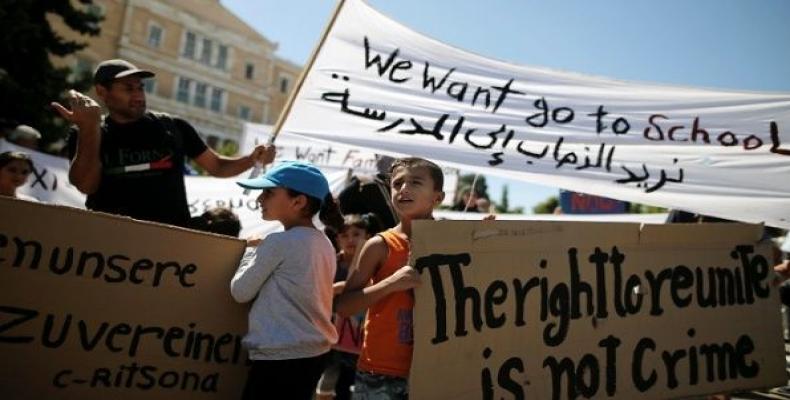Athens, August 4 (RHC)-- Hundreds of Syrian refugees stranded in Greece have protested at the German embassy in Athens against delays in reuniting with their relatives in Germany. The group of refugees, mainly women and children, marched from the Hellenic Parliament to the embassy holding up cardboard banners in English reading "I want my family" and “No more waiting” while demanding to travel to Germany.
Shaker Khalil, one of the protest organizers, told reporters that Germany “wants to block or delay reunions and leave our families divided.” He said that under current regulations, asylum seekers are entitled to join family members elsewhere in the European Union within six months from the date their request is approved.
Almost 900 refugees traveled from Greece to Germany to reunite with their relatives by April this year. But after that, the number of people reaching Germany had dropped to about 70 on average per month.
An official letter leaked by a Greek daily in May showed that there is a tacit understanding between Greek and German migration officials to limit the number of reunification approvals.
"Family reunification transfer to Germany will slow down as agreed," Greek Migration Minister Yiannis Mouzalas wrote to German Interior Minister Thomas de Maiziere in the May 4 letter obtained by Efimerida ton Syntakton. Mouzalas said the slowdown was due to "technical difficulties." In his letter, he said Berlin and Athens had to agree on a "common line" so that Athens is not blamed for the delays.
About 60,000 refugees and migrants from Syria, Afghanistan and Iraq have been stranded in Greece for over a year since the closure of the Balkan route to central and western Europe in March 2016.
By July 24, a total of 16,803 persons had been relocated from Greece and 7,873 from other EU countries under the 2015 deal between member states that committed to accept at least 40,000 people from Greece and Italy within two years, according to the European Commission.
Nearly 11,000 refugees and migrants have crossed to Greece from Turkey this year, down from 173,000 in 2016. Most of the new arrivals are women and children. "My message is 'enough waiting, enough suffering,'" Malak Rahmoun told Reuters.
The 41-year-old Syrian migrant lives in a Greek camp with her three daughters while her husband and son are in Berlin. Rahmoun said she and her daughter applied for family reunification last year, but that Greek authorities have not given a clear reply.
Refugees in Greece Protest Slow Pace of Family Reunifications

Related Articles
Commentaries
MAKE A COMMENT
All fields requiredMore Views
- Presidential candidate Luisa González commits to the right to education, health and social justice in Ecuador
- Cuba defends Africa-America shared future at UN Tourism Summit
- Cuban foreign minister arrives in Honduras for CELAC Summit
- Massive anti-Trump protests take to the streets across the United States
- IX CELAC Summit concludes with the signing of the Tegucigalpa Declaration

